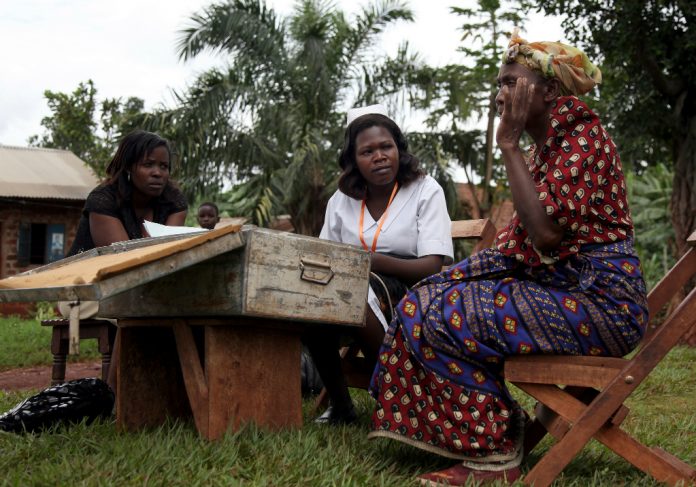
Nurse listening to a patient in Jinja, Uganda. Credit Laura Elizabeth Pohl/Bread for the World

In a joint statement issued on 4th May 2018, Nursing Now, ICN and ICM said:
The health workforce has an enormous contribution to make in both managing and preventing Noncommunicable Diseases (NCDs) and needs to be a central part of the NCD strategy.
There are more than 40 million health professionals who can bring their education, skills and commitment to the task and help close the gap between the great ambitions of the NCD strategy and action on the ground to achieve results.
The over 20 million nurses and midwives are the most widespread group of professionals and very much part of the communities they serve. They can make 3 major contributions:
- Managing the care of people with NCDs – nurses and midwives are increasingly taking on the management of NCDs and providing high quality, accessible and cost-effective services
- Promotion of health, prevention of disease and early detection – midwives and nurses can play an even greater role by using every contact – for treatment, ante-natal or post-partum care – and every opportunity for promotion, prevention and early detection
- Supporting local communities and community health workers – nurses and midwives are local people who can work with local communities on improving health and help make community health workers more effective by providing support, supervision and a point for referral
We urge the Commission to mobilise the vast resource of nurses and midwives in this vital cause and we stand ready to help with our very extensive networks of members and supporters from the majority of countries across the world.
Some examples of many:
- Managing the care of people with NCDs – In Sierra Leone, midwives supported pregnant women to get the midwifery care they needed during the Ebola crisis and in Tonga, community based NCDs nurses have improved monitoring and treatment of diabetes and cardiovascular disease and increased community participation in exercise and nutrition programmes.
- Promotion of health, prevention of disease and early detection – In Portugal, nurses work with schools and parents on mental health and have improved well‐being, self‐esteem, coping capacity and reduced depressive symptoms. In Sweden, midwives support teenagers to take the lead in their sexual and reproductive rights by protecting themselves appropriately
- Supporting local communities and community health workers – In Brazil, nurses supervise community healthcare workers and between them reduced the infant mortality rate by 32% in 5 years. In Morocco, midwives supported (adolescent) women in difficult to reach communities to receive cervical screening.
ICN, ICM and Nursing Now
The International Council of Nurses (ICN) is a federation of more than 130 national nurses associations (NNAs), representing the more than 20 million nurses worldwide. ICN works to ensure quality nursing care for all, sound health policies globally, the advancement of nursing knowledge, and the presence worldwide of a respected nursing profession and a competent and satisfied nursing workforce.
The International Confederation of Midwives (ICM) supports, represents and works to strengthen professional associations of midwives throughout the world. There are currently 132 Midwives Associations, representing 113 countries across every continent representing more than 500.000 midwives.
Nursing Now is the global campaign to improve health globally by raising the profile and status of nursing. Founded in February 2018, it already has groups active in over 40 countries.
For more information on how you can influence the NCD Commission, check out this guide.





